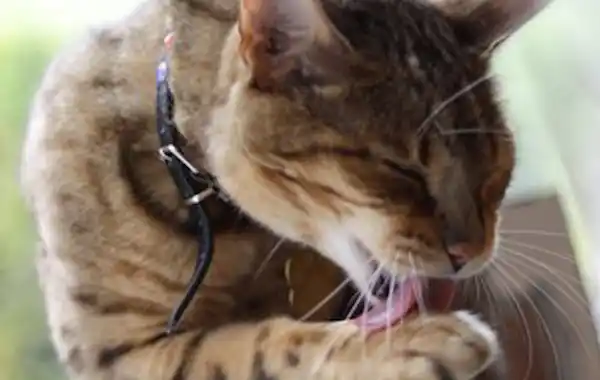Fur loss is most commonly caused by 'over-grooming', where the cat excessively licks the hair.
Vet Nikki Gaut says: Fur loss is most commonly caused by 'over-grooming', where the cat excessively licks and ingests the hair leading to bald patches in the coat of varying size and in different locations.
Over-grooming can occur for a variety of different reasons - one of the most common being allergy. Cats may become allergic to certain types of food or environmental allergens such as house dust mite, or even a combination of things. The allergy causes the skin to feel itchy and the cat will therefore use its rough tongue to lick and nibble at various places on the coat. It can be difficult to pick up that your cat is itchy, as they don't always scratch like dogs or other species.
The most common cause of over-grooming is due to a flea allergy. Often you will not be aware of any fleas on the coat as the cat has fastidiously groomed out every last one of them, but it doesn't mean they aren't there.
Even for indoor cats, regular monthly flea control from your vet is recommended as even a small flea burden can cause a skin hypersensitivity that will cause the cat to over-groom and lose his fur. Your vet can recommend which flea treatment to use and whether the skin has a secondary infection from the over-grooming and needs other treatments such as anti-inflammatories and antibiotics. They will also advise you on treating other pets in the house and making sure that the environment is treated to prevent re-infestation.
Other less common causes of hair loss can be metabolic problems or even pain in some situations. As we all know, cats are masters of disguise when hiding pain and so certain conditions such as painful cystitis or arthritis can, in some cases, lead to over-grooming - especially on the stomach. Again, your vet should perform a full examination that may pick up other clinical findings associated with an underlying problem.
Cats can use grooming behaviour to soothe themselves when anxious and this can develop into a compulsive behaviour. Sometimes conflict both inside and outside the home with other animals may be causing stress, and environmental changes such as house renovations, introducing a baby to the home or having visitors are all stressors as well. Should stress be the cause, the key is trying to pinpoint and remove the trigger and then a variety of measures can be used to try and alleviate it. The use of Feliway in the home, calming diets or medications alongside environmental modifications can all help in this situation but often your vet will refer your cat to a behaviourist who specialises in this field.
Hopefully once the cause of the hair loss has been found, the appropriate treatment can be initiated and your cat can get back to his old self.







